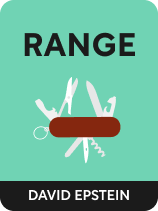

This article is an excerpt from the Shortform book guide to "Range" by David J. Epstein. Shortform has the world's best summaries and analyses of books you should be reading.
Like this article? Sign up for a free trial here .
Are you thinking of reading Range by David Epstein? Is the book really worth all the hype?
David Epstein is a former writer for Sports Illustrated who has built his career writing about the science behind athleticism. In Range, Epstein makes the case for generalism: a broad competence in many areas rather than the extreme mastery of one. Not only does cultivating range free you to pursue more of your interests, it entails professional advantages you could have never predicted.
Here is our review of Range by David Epstein.
Review of Range
Range is a bold challenge to widely-held assumptions about success and human potential. Whether you want to become an Olympic sprinter, a neuroscientist, or a virtuoso musician, the traditional advice is the same: Start practicing as soon as you can and don’t stop until you’re the best in the world.
However, David Epstein argues that this narrow, highly specialized path is not as reliable as it’s been made out to be. Instead, broad competence in a wide range of skills is the best way to get ahead of the competition. Counter to what you’d expect, learning to do several things well makes you better at each one. Being a jack of all trades is often the way to become master of all.
In reality, very few world-class professionals attain success in the way you’d expect. Rarely have entrepreneurs, scientists, or even athletes trained from birth to do what they’re doing. In this book, Epstein makes the case that starting late or switching fields is nothing to be ashamed of. No matter where you are in life, you have as good a chance as anyone to become one of the greats—your unique history may even give you the upper hand.
About the Author
David Epstein first gained public recognition as a senior writer for Sports Illustrated, investigating current events in the world of sports and frequently making use of his scientific background (an MS in environmental science).
After leaving Sports Illustrated, Epstein worked as an investigative journalist for the Pulitzer-winning online news source ProPublica, delivered TED Talks such as “Are athletes really getting faster, better, stronger?” that have collectively racked up more than 10 million views, and hosted a podcast called How To! for online magazine Slate.
Connect with David Epstein:
The Book’s Publication
Publisher: Penguin Random House
Imprint: Riverhead Books
Range was published in 2019, becoming a New York Times bestseller. This is his second book, preceded in 2013 by the best-selling The Sports Gene, a deep dive into the various ways both genetics and life experience impact an athlete’s potential for success. Range is a broader application of many of the ideas in The Sports Gene (where Epstein first challenged the 10,000-hour rule) and is more directly argumentative.
Since Range’s publication, Epstein has started the Range Widely newsletter, intended to help readers “expand their range” and learn about interesting connections between seemingly unrelated fields.
The Book’s Context
Range’s thesis directly challenges many popular books on the subject of learning and human performance, especially those that emphasize “deliberate practice” such as Peak by Anders Ericsson and Outliers by Malcolm Gladwell. One chapter, “The Trouble with Too Much Grit,” is a direct critique of Grit by Angela Duckworth, which Epstein argues underestimates the value of quitting in some situations.
Additionally, Range is significantly influenced by previous books that have challenged the role that pure quantity of experience plays in human success, directly utilizing ideas from Make It Stick by Peter Brown, The Dip by Seth Godin, and Superforecasting by Philip Tetlock. Most of the knowledge in Range is aggregated from other sources rather than fully original, but Epstein weaves these ideas together into a single cohesive argument.
Critical Reception
Range reviews from major publications including The New York Times, The Wall Street Journal, Forbes, and NPR were glowing. It was one of six books on the McKinsey and Financial Times shortlist for Business Book of the Year.
Critics praised Range for its convincing argument against commonly accepted wisdom, as well as the life-affirming conclusion of that argument. Critics and readers also appreciated Epstein’s engaging writing style. The true stories he uses in support of his thesis are consistently fascinating. Despite the fact that Range was intended to disprove the main idea of his book Outliers, Malcolm Gladwell has expressed admiration for Range and provides the blurb on the book’s front cover.
Critics of Range have claimed that Epstein is a little too optimistic about the average person’s chances to succeed without much deliberate practice. “Those who are richly endowed with talent may find it easy to excel in multiple domains,” writes the New York Times. “The rest of us, however, must lean heavily on the practice part of the equation.” They argue that Epstein could get away with downplaying talent or practice, but not necessarily both.
Additionally, some readers find Range’s one-note argument to become tedious when stretched across several chapters. They also criticize Epstein for lacking the evidence necessary to support his argument, saying he relies too heavily on anecdotes.
Commentary on the Book’s Approach
Range is an intentionally fluffy, accessible collection of scientific evidence in support of a thesis with strong mass appeal. Epstein strikes a tone between inspirational optimism and even-handed science-based realism. Some readers may feel that Epstein’s empowering argument leans too far toward wishful thinking, but his consistent return to statistics and concrete studies urges the reader to seriously consider his ideas.
Commentary on the Book’s Organization
Each chapter in Range tackles a single idea, beginning with an extended anecdote that lays the foundation for its argument. However, Epstein doesn’t explicitly connect each chapter to the others in any overarching structure, instead alluding to previously discussed concepts whenever the opportunity arises organically. The book tends to rely on narrow segues from one topic to another instead of zooming out to make the big picture easy to see.

———End of Preview———
Like what you just read? Read the rest of the world's best book summary and analysis of David J. Epstein's "Range" at Shortform .
Here's what you'll find in our full Range summary :
- Why it's better to be proficient in a range of skills rather than becoming a specialist in one
- Why you're never “too late” to pursue something you’re interested in
- Why the nontraditional background of a generalist gives them an edge






